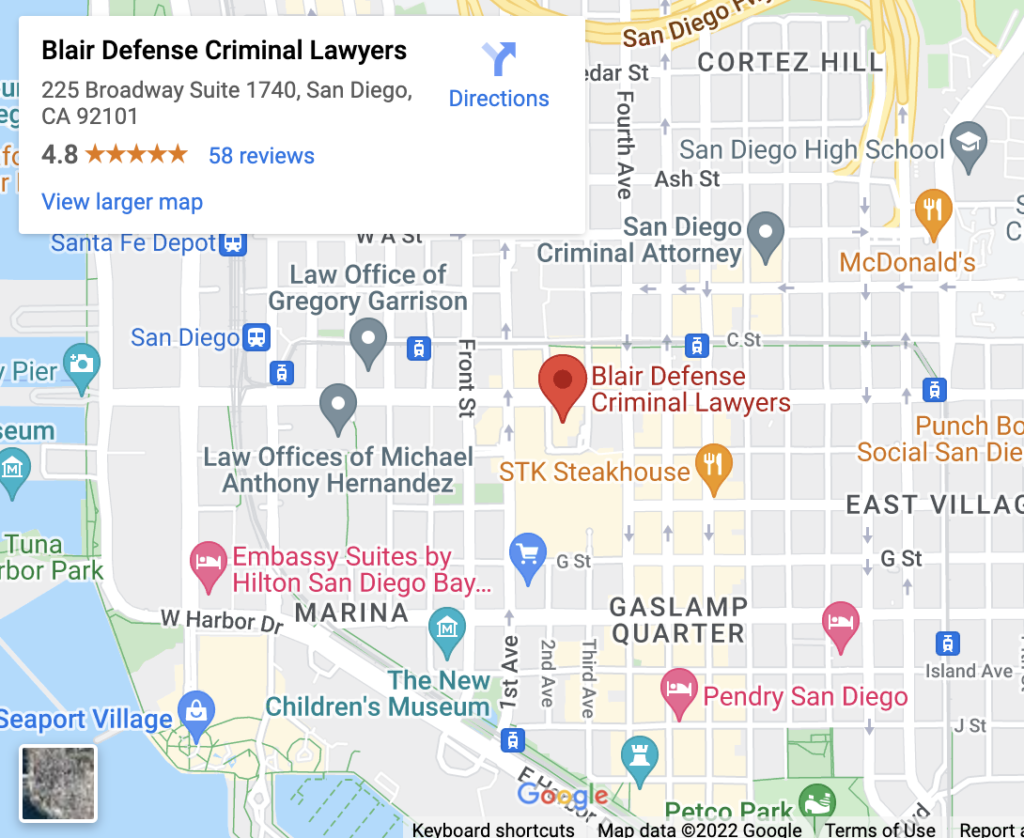
California punishes accomplices with the same severity as the people who committed the crime. Therefore, it is crucial that you contact a San Diego criminal defense lawyer immediately if you are charged as an accomplice to a crime. The same is true if you are charged as being an accessory after the fact of a crime.
Table of Contents
What Is an Accomplice to a Crime in California?
California Penal Code §30 defines persons concerned in the commission of a crime as principals or accessories. An accessory is someone who aids or contributes to the commission of a crime or conceals the commission of a crime.
The act of aiding and abetting is defined in California Penal Code §31. This criminal act is also referred to as accomplice liability. The code defines aiding and abetting as facilitating, encouraging, or aiding someone in the commission of a criminal act.
The law creates criminal liability for anyone who encourages or assists in the commission of a crime as a principal. Therefore, even though an accomplice did not physically commit the crime, they can be punished just as if they were the principal.
Even though you played an insignificant role in a crime, you could be punished under the accomplice law for assisting in the commission of the crime. Therefore, you could serve as much jail time as the person who committed the crime.
When Does a Prosecutor Charge Someone With Being an Accomplice?
Aiding and abetting do not require that you conspire to commit a crime. For example, you do not need to agree to commit robbery to be charged as an accomplice. You could be charged under the aiding and abetting theory if you:
- Know about the person’s plan to commit the crime
- Promoted, aided, or instigated the crime
- Caused a person to become drunk to cause them to commit a crime
- Encouraged the person to commit a crime
- Facilitated the plan to commit the crime
- Threatened, coerced, commanded, or compelled a person to commit a crime
- Encouraged, counseled, or advised a child under 14 years old or a mentally incapacitated person to commit a crime
The above examples are not the only factors a prosecutor considers. There are other acts and circumstances that could lead to a charge of aiding and abetting.
An accomplice does not need to be at the scene of the crime to be charged with a crime. You also do not need to act in advance. An accomplice assists a person in committing a crime when they provide aid in advance of the crime, when they discover a plan to commit a crime, or when the crime is being committed.
Anyone who facilitates the commission of a crime can be charged with the underlying crime as a principal. Driving the getaway car is an example of being an accomplice. However, a person could also be charged under the aiding and abetting theory if they provided the getaway car but did nothing else related to the commission of the crime.
What Are Some Defenses to Charges of Being an Accomplice?
There are many defenses you can use when charged with aiding and abetting. Your San Diego criminal defense attorney might argue:
False Allegations
A person might accuse you of being an accomplice for better terms under a plea agreement or a charge reduction. Because the law does not require the prosecution to produce any physical evidence that a person was an accomplice, it is easy to raise false allegations.
Lack of Legal Duty to Act
Some individuals are under a legal duty to act if they discover information about criminal activity. Mere knowledge of a crime does not make you guilty of aiding and abetting unless you have a duty to act. However, most people are not under a legal duty to act.
You Did Not Assist, Encourage, or Facilitate the Crime
If you did not intentionally engage in activities or conduct that resulted in the commission of a crime, you are probably not guilty of aiding or abetting. Accomplices must act with intent to assist with a crime.
For example, if you go to the store with a friend knowing that friend is going to steal and help watch out for security, you are likely an accomplice. However, if your friend shoplifts while you are with them, but you did not know they were going to commit a crime and you did nothing to help them, you are not aiding and abetting.
You Changed Your Mind
Your attorney might be able to fight the criminal charges if you changed your mind before the other individuals committed the crime. A successful defense based on this theory requires you to prove:
- You notified everyone involved in the crime that you would not participate in committing the crime
- You did everything possible to prevent the others from committing the crime
Doing everything within your power to prevent the crime generally includes notifying the police. Otherwise, you did not do everything possible to prevent the crime.
You Were an Accessory After the Fact
Suppose you did not facilitate the commission of a crime, but you assisted in covering up the crime after the fact. In that case, you could be charged with an accessory after the fact under California Penal Code §32.
Accessory after the fact is a separate criminal charge. It is not the same as being an accomplice. Therefore, the penalty may be less than the penalty the principal receives for committing the crime.
Being an accessory after the fact is a wobbler offense. A felony conviction could result in up to three years in prison and a fine. Being convicted under a misdemeanor charge could result in up to one year in jail and a $5,000 fine.
What Should I Do if I Am Accused of Being an Accomplice?
Do not talk to the police or the prosecutor without a criminal defense attorney present. The statements you make could be used against you to prove that you facilitated, aided, or encouraged someone in committing a crime.
Instead, respectfully state you intend to exercise your right to remain silent. Then, contact a law firm to discuss your case with a lawyer.
Accomplice charges could result in significant penalties depending on the underlying crime. Therefore, hiring a criminal defense lawyer is in your best interest. If a deal is available, you want to be the first to have a lawyer negotiate a plea bargain.
Schedule a Free Consultation With Our San Diego Criminal Defense Lawyers
Call our law firm if you have been charged with a crime or as an accomplice to a crime. Our experienced San Diego criminal defense attorneys are here to help you. Ensure you understand your legal rights and defense options before talking to law enforcement officers or prosecutors.

